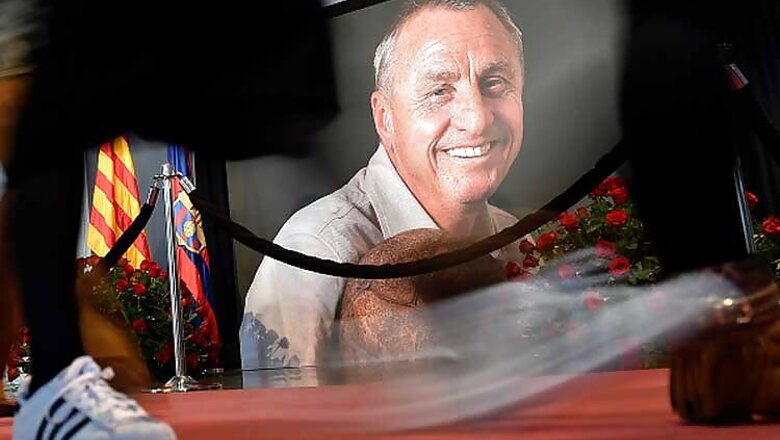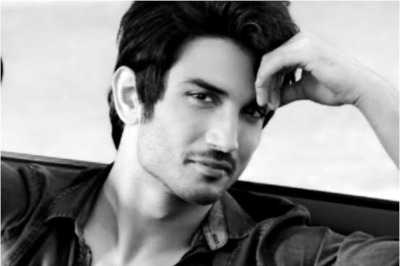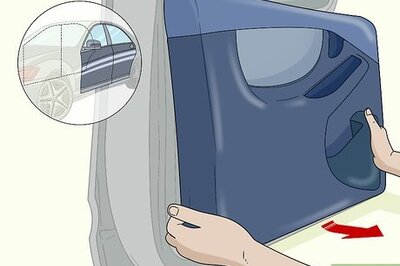
views
Barcelona fans, players and officials paid tribute Saturday to the memory of former player and manager Johan Cruyff in front of a memorial space set up inside the club's Camp Nou stadium.
The eulogies for the Dutch legend, who died from lung cancer on Thursday at the age of 68, were led after a minute's silence by club president Josep Maria Bartomeu.
Standing in front of a giant photo of a smiling Cruyff, Bartomeu said that it was a sad day not only for everyone who loved Barcelona football club, but also for everyone who loved football.
"In agreement with the Cruyff family we set up this memorial to allow everyone to express their feelings and say a final farewell to this legend," he said.
Hundreds of people of different nationalities, many in tears, filed past the memorial, which was bedecked with flags and bouquets of red roses, and signed a condolences book.
Johan Cruyff "came to Barcelona when Barcelona was winning nothing ," said one of them, Ignace Mosengo, a 45-year-old from the Congo who was on holiday in Barcelona with his wife.
"He gave them a new style of game, with intricate passing, to keep possession of the ball. What we admire in the current Barcelona team all harks back to him," he said.
The memorial will remain in place until Tuesday evening with Barcelona football club observing a period of mourning until April 2.
Fans as well as tourists had already placed tributes at the entrance to the Camp Nou stadium on Friday, including roses and lollipops.
Cruyff often patrolled the touchline sucking on a lollipop which became his prop after he stopped smoking cigarettes.
- Mark of Respect -
On Friday night, the Netherlands' international against France in Amsterdam was halted in the 14th minute as a mark of respect.
A huge portrait banner showing Cruyff and his familiar Dutch orange number 14 shirt was hauled across one end of the ArenA stadium in his home city as fans and players applauded.
A seat covered with flowers and a number 14 shirt was left empty in the VIP stand at a game which saw the Dutch slip to a 3-2 defeat against the hosts of the Euro 2016 tournament this summer.
It was the first time that an international has been halted for such a gesture.
"It was special," said France coach Didier Deschamps. "A great man like Johan Cruyff deserved such a tribute and the stadium responded to him."
Leading football figures have meanwhile continued to pay tribute to the the Dutch star and highlight the importance of Cruyff's impact on the game.
"I knew nothing about football before knowing Cruyff," said Pepe Guardiola, the Bayern Munich coach who played under Cruyff at Barcelona and later became its most successful coach.
"He helped us to understand football ... and he encouraged you to trust your instinct, your nose. To make decisions," Guardiola told Catalan radio station Rac1.
"He revolutionised football and, in particular, he embodied everything about Barcelona's playing philosophy," said Joachim Loew, coach of the German team who won the 2014 World Cup.
A one-time heavy smoker who gave up after double heart by-pass surgery in 1991, Cruyff revealed in October last year that he had lung cancer.
The Cruyff family said it was arranging "a private farewell to Johan." But they did not say when it would be held.
The family also said it would soon announce a public memorial for the player who won three European Cups as a player with Ajax Amsterdam and European player of the year titles in 1971 with Ajax and 1973 and 1974 with Barcelona.
Cruyff, who is considered to be one of the greatest players of all time, moved from Ajax to Barcelona in 1973 and stayed there until 1978.
He returned 10 years later to coach the Spanish side. They won four consecutive league titles and their first ever European Cup in 1992 at Wembley.
Cruyff helped end an era of dour defensive football, inspiring the Dutch team in their Total Football offensive that took them to the 1974 World Cup final where they were narrowly beaten by Germany.




















Comments
0 comment